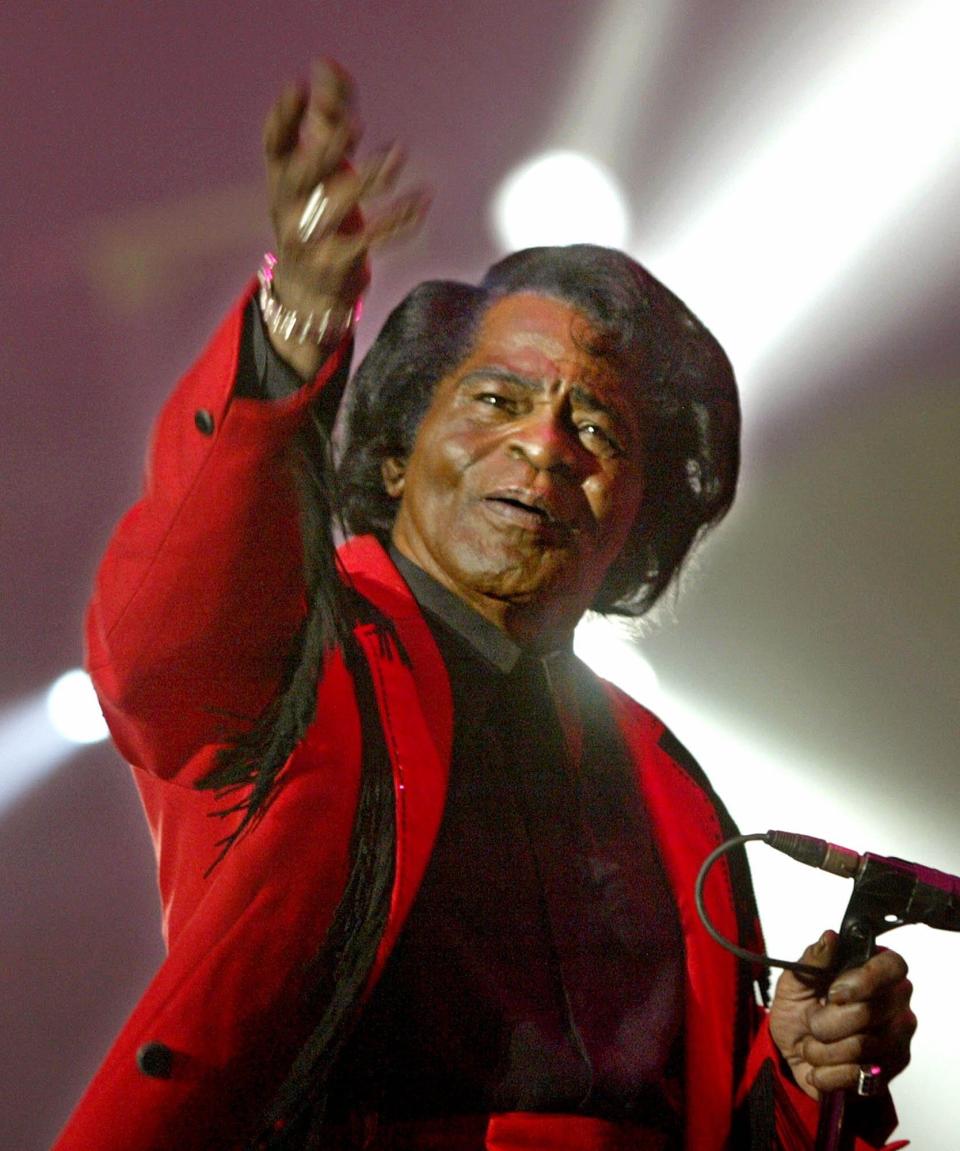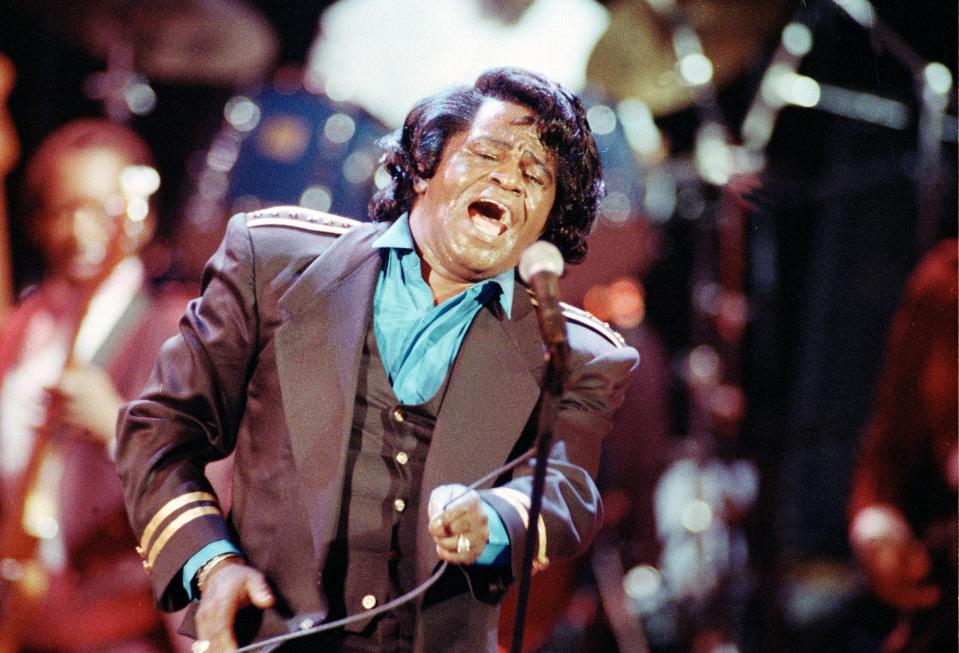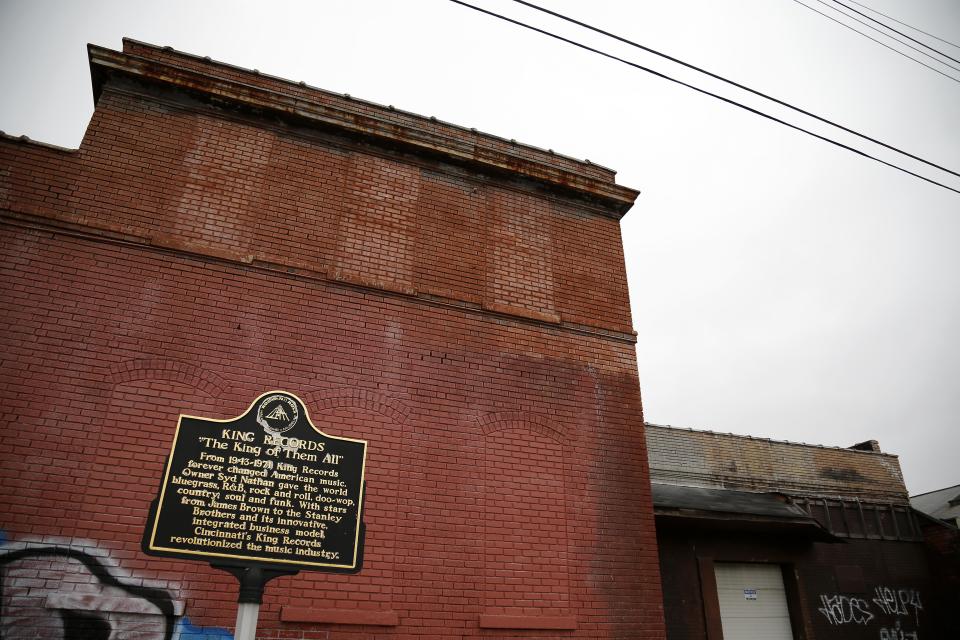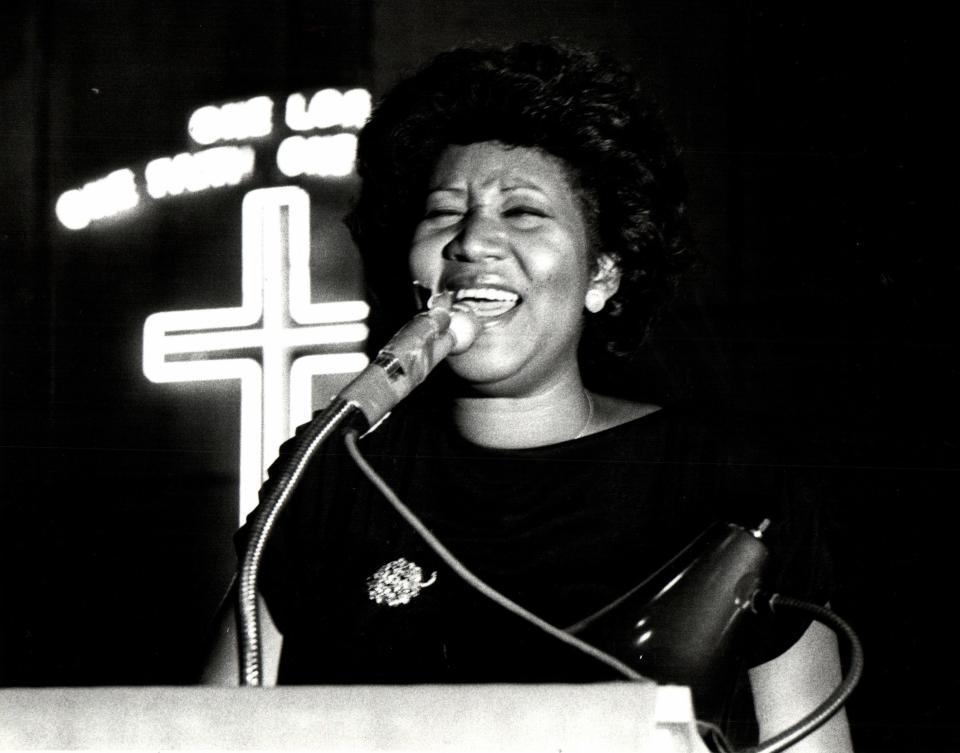Cincinnati Black Music Walk of Fame to induct James Brown, The Deele amid grand opening

- Oops!Something went wrong.Please try again later.
- Oops!Something went wrong.Please try again later.
- Oops!Something went wrong.Please try again later.
- Oops!Something went wrong.Please try again later.
This year marks the Cincinnati Black Music Walk of Fame's third class of inductions, and starting Saturday, the stars will finally strut their stuff as the physical walk site comes to life.
The Black Music Walk of Fame is holding a grand opening celebration on Saturday, July 22, at noon, outside the Andrew J. Brady Music Center. The Ohio Players will be performing a free concert to celebrate the occasion. Event organizers ask that those wishing to attend the opening dress in all-white attire.
Cincinnati's Black Music Walk of Fame is the brainchild of Hamilton County Commissioner Alicia Reece. Reece will be speaking and sharing her story on Saturday as part of the ceremonies.

This year's inductees are James Brown, The Deele, Philippé Wynne and Louise Shropshire.
This star-studded new class joins 2021 inductees Bootsy Collins, the Isley Brothers, Dr. Charles Fold and Otis Williams, and 2022 inductees Penny Ford, Midnight Star, Wilbert Longmire and Hi-Tek.
What is the Cincinnati Black Music Walk of Fame?
The Black Music Walk of Fame starts with a grand arch entrance. As you walk through, kiosks dispersed about the path offer historical information about inducted artists, which can easily be accessed on a smartphone. In the center, there's a space for open dancing and a special section for drumming to tunes produced by past inductees. Drumming to the beat of the records sets off a synced light show in the fountain nearby. The walk also includes locations specifically designed for social media photography.
As you prepare to see the site and stars come to life, here's a deeper dive into each of the 2023 Black Music Walk of Fame inductees.
The Deele

The Deele is one of the premier R&B groups to hail from Cincinnati. Formed in 1981 when Kenny "Babyface" Edmonds linked up with Cincinnati natives Antonio Marquis "L.A." Reid (drums), Kevin "Kayo" Roberson (bass), Darnell "Dee" Bristol (vocals, percussion), Carlos "Satin" Greene (vocals) and Stanley "Stick" Burke (guitar, keyboard) in the early '80s.
The Deele grew to quick success, producing three hit records in four years as a complete unit, from 1983 to 1987. Their biggest hit, "Two Occasions," off of their album, "Eyes of a Stranger" (1987), peaked at No. 10 on the U.S. Billboard Hot 100. That same year, The Deele's breakout stars, Babyface and L.A. Reid, started their own journeys in the music business, creating the record label LaFace. LaFace became a huge success, signing acts as big as Outkast and Usher, signed at just 14 years old.
Reid's success as an executive is no small deal but has mostly gone under the radar of popular audiences. Babyface, on the other hand, went on to have quite the solo career, with R&B chart-toppers like "Every Time I Close My Eyes (ft. Kenny G)" (1996) and "When Can I See You" (1993). In the course of Babyface's career, he worked with artists as varied and renowned as Madonna, Boyz II Men, Eric Clapton, Ye and Whitney Houston.
James Brown

James Brown is one of the most important musicians of the 20th century. Often referred to as the "Godfather of Soul," Brown's love, passion and soul poured through on every one of his records and every live performance. His infectious sound and performance style served as the inspiration for countless rock, funk, R&B and soul performers, but Brown is also hip-hop's most sampled artist, which has brought new life to his ever-enduring records.

Brown spent much of his formative musical career in Cincinnati producing music at King Records, formally located on Brewster Street, in Evanston, from 1956 to 1971. Brown walked into King's Records studios in 1956 a 22-year-old wannabe pop star with nothing more than bright ambition, immense talent and a stellar band, The Famous Flames. By the time the label closed and Brown left Cincinnati – 15 years later, in 1971, at the age of 37 – he had already won a Grammy for best R&B recording, garnered over 10 No. 1 R&B hits and become one of the most recognizable names in the music industry, and in the country.

Brown's induction to the Cincinnati Black Music Walk of Fame marks one of only a couple celebrations of Brown's contributions to Cincinnati history. A plaque outside the old King Records studio in Evanston commemorates Brown and his connection to the city. The large mural on the corner of Liberty and Main streets in Over-the-Rhine is, of course, another.
Still, Cincinnati was home to one of this country's most important and influential artists during arguably the most formative part of his career. Brown's induction to Cincinnati's Black Music Walk of Fame is an important step in solidifying his connection to the city in the history books of public awareness.
Philippé Wynne
Born in 1941 in Cincinnati, Philippé Wynne and his three siblings were abandoned by their divorced parents in 1952 and moved to the New Orphanage Asylum for Colored Children in Avondale. At 15, Wynne and his brother, Michael, ran away from the orphanage and traveled to Detroit to find their mother and start their music careers. In Detroit, Wynne began his career as a gospel singer with his brother, but quickly switched over to R&B, enjoying some relative success as a vocalist with Bootsy Collins' Pacemakers and even fellow inductee James Brown in the late '60s. Later, after a brief stint in Germany, Wynne returned to the States and found his calling as the lead vocalist of The Spinners.
During Wynne's time with The Spinners, the group produced some of their biggest hits, including “I’ll Be Around” (1973), “Could It Be I’m Falling In Love” (1973) and “The Rubberband Man” (1976). Wynne split ways with The Spinners in 1977 when they refused to change their name to "Philippé Wynne and The Spinners." Neither Wynne nor the remaining Spinners were able to garner much success after their separation.
Wynne died of a heart attack during the encore of a live performance at Ivey's Nightclub in Oakland, California, in 1984. He was 43.
Wynne is also the uncle of Hamilton Country Commissioner Summerow Dumas, who has played an instrumental role in the establishment of the Cincinnati Black Music Walk of Fame.

Louise Shropshire
Louise Shropshire is one of America's most unsung lyrical heroes, though she penned the original lyrics to one of America's most important anthems: "We Shall Overcome."
"We Shall Overcome" was famously popularized by folk legend and activist Pete Seeger. Seeger, however, was always open about his decidedly minor role in crafting the civil rights anthem. Seeger attested that he merely adapted the lyrics, changing "We will overcome" to "We shall overcome," and set the tune to a beat.
Many believe the song originated with Charles Albert Tindlay's "I'll Overcome Someday," penned in 1901, though recent discoveries suggest the origin is more complicated.
In 1942, Shropshire produced a song called "If My Jesus Wills." Shropshire's song went by a different title and contained slightly different lyrics. Shropshire served as the music minister of Revelation Baptist Church in the West End in the 1960s. Her song had a more religious bend. The open lyrics go as follows:
I'll overcome, I'll overcome, I'll overcome someday.
If my Jesus wills, I do believe, I'll overcome someday.
The opening lyrics to the well-known "We Shall Overcome" are startlingly similar:
We shall overcome, we shall overcome, we shall overcome someday.
Oh, deep in my heart, I do believe, we shall overcome someday.
The rhythmic and lyrical similarities between the two songs have led experts to believe that Shropshire's "If My Jesus Wills" surely served as the foundation for what many know today as "We Shall Overcome."
John Morris Russell, conductor of the Cincinnati Pops Orchestra, considers "If My Jesus Wills" to be the "most important piece of music ever composed in Cincinnati."
This article originally appeared on Cincinnati Enquirer: Cincinnati Black Music Walk of Fame to induct James Brown, The Deele

